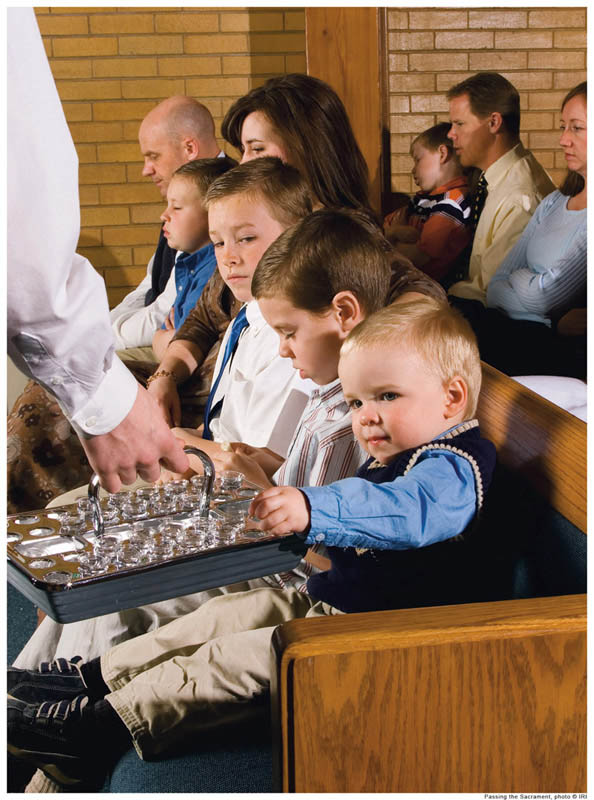“Mom, why can’t I _____ on Sunday?” Fill in the blank with whatever activity your child misses participating in, and you have a typical scenario playing out in many families each week. Keeping the Sabbath day holy often becomes a day of agony, when our family is not equally on board with the purpose of the Sabbath.
Last week I compared the Sabbath day to the lesson about filling the Mason jar. We got as far as the pebbles and sand—determining that these last two objects were the hardest to understand as they can be subjective in what they represent. What constitutes Sabbath day activity to some might not for others. How do you find the perfect recipe for your family? Here is a story that might help you rethink Sabbath day observance and how you teach it to your loved ones.
A man and a pigeon
 A man sitting on a park bench with a bag of popcorn once wanted to feed a lonely pigeon, so he grabbed a handful of popcorn from the bag and tossed it toward the bird. It flew away abruptly, no doubt wanting to avoid the assault. The man was left alone.
A man sitting on a park bench with a bag of popcorn once wanted to feed a lonely pigeon, so he grabbed a handful of popcorn from the bag and tossed it toward the bird. It flew away abruptly, no doubt wanting to avoid the assault. The man was left alone.
What did he do wrong? By throwing a handful of popcorn at the bird, he took what should have been a good thing and made it frightening, undesirable, or downright annoying.
Are we making Sabbath day habits annoying for our children?
Think about it. We know Sabbath day observance will strengthen our children. It will make our children spiritually stronger and able to withstand the filthy influences of the world. It will help our children become closer to Heavenly Father and to return to his presence one day. But bombarding them with anything—even if it is good—will have the opposite effect. It will drive them away.
Remember what it means to remember
“Remember the Sabbath day” is the first commandment without “thou shalt not” in front of it. Coincidence? Maybe not. Maybe Heavenly Father knew that Sabbath day observance was best observed with gentle persuasion. Yet we have turned the Sabbath day into a list of “thou shalt nots.” And what happens when some families observe some activities as “shalt nots” while other do not? Even families within the same congregation—how do you explain that to your children without an argument?
Start with a clean slate.
 If you are struggling with your family as to what to do on Sunday beyond church attendance, try this experiment. Gather them all together and announce you will start with a clean slate. Scrap the “thou shalt not” list. Re-title it, “Remember the Savior.” Then begin a discussion on what it means to remember.
If you are struggling with your family as to what to do on Sunday beyond church attendance, try this experiment. Gather them all together and announce you will start with a clean slate. Scrap the “thou shalt not” list. Re-title it, “Remember the Savior.” Then begin a discussion on what it means to remember.
To remember is an inward reflection. To remember is to evoke thought. When thought is given its sacred due, it is elevated. Remembering someone who died for you—in this case, our Savior, Jesus Christ— stirs deep emotion at differing levels for each individual. It takes time to develop, years for some.
The Sacrament prayer asks us to remember. Remember the sacrifice of the Savior—remember his body and blood which were shed for us. Remember, and we are then promised to have his spirit to be with us. Remember so we can feel that spirit cleanse our soul and allow us to be a pure vessel once again. Remember so that we can be worthy to have the Holy Ghost influence us to do good works again, free of guilt.
Work together to remember
Sitting down with your family to discuss Sabbath day activities will help each person in the family feel they have an important say in the decision-making process. It will help them be a part of determining what is worthy and what is not. When children see they are important to the family, when they feel they are part of the rule making process and not simply subjected to family rules, they will take ownership of the choices made.
Begin the task of rebuilding the list based on the word, remember. In this way, everyone can refocus on the Savior as their basis for decision. It is easy then to see how some activities can be eliminated—work related activities when possible, and unnecessary shopping.
Rather than decide if the activity is good for the Sabbath, decide how the activity shows your reverence to the Savior in remembering him. Then make your list accordingly. If you start slowly, you can easily build a list that everyone can agree on. Family time, visiting the sick, watching uplifting movies, spending time in nature—these are all activities that can easily revolve around remembering the Savior, if they are done with Him in mind.
 Tackling more difficult activities will take compromise and testimony. I took ballet as a child and I had to miss a dance recital one year because it fell on Easter Sunday. I still went to dance practice each week, but when the class practiced for the recital I had to sit out. It was difficult, but even as a child I felt it was the right thing to do. If you have a similar experience like this, testify to your children about it. They need to know you went through the same trial and it helped you gain a testimony—sometimes the testimony comes only after the trial of faith.
Tackling more difficult activities will take compromise and testimony. I took ballet as a child and I had to miss a dance recital one year because it fell on Easter Sunday. I still went to dance practice each week, but when the class practiced for the recital I had to sit out. It was difficult, but even as a child I felt it was the right thing to do. If you have a similar experience like this, testify to your children about it. They need to know you went through the same trial and it helped you gain a testimony—sometimes the testimony comes only after the trial of faith.
Compromise with tenderness
Some family dynamics are more difficult than others. Don’t compare yourself to other families. Be willing to work with your family’s particular needs. You may convince your son it is best not to play on the traveling baseball team when the games are only played on Sunday, but he might still be frustrated. A nice compromise might be to have a family game of catch in the back yard. This way you are spending quality family time together and helping your children feel their needs are being met. In time as they grow, activities can be revisited and evaluated as to Sabbath remembrance. Take it slowly and allow your children’s spiritual nature to grow in its own way. Heavenly Father knows the unique dynamic of your family and He will bless you for your understanding nature.
Revisit the pigeon
The story of the man in the park has another chapter. He returned the next day with a bag of popcorn, and he encountered the same pigeon. Instead of throwing it a handful of popcorn, he tossed one kernel in its direction. The kernel fell close to the pigeon, but far enough away that it wasn’t a threat. The pigeon hopped over and scarfed it up. The man was happy.
The next day he returned and tossed another kernel toward the pigeon, this time a little closer to the bench. The pigeon hopped over to eat it. He tossed another, then another. The pigeon seemed to trust the man and did not fly away. By the end of the week, the man had the pigeon eating out of his hand.
If we approach Sabbath day observance in the same manner, we too can see our children learn to appreciate the Sabbath, revere the Savior for what he did, and develop Sabbath day habits that will endure through their lifetime.
Nanette O’Neal loves the gospel and is very happy to share her testimony on LDS Blogs. She is a convert to the church and still feels the spirit burn strong within her heart. She graduated from Mason Gross School of the Arts with a degree in music education and has taught children and adults in the private and public sphere for over twenty years. Nanette continues to study the gospel and the art of writing. She writes weekly inspirational articles on her blog and is currently working on an LDS fantasy novel series, A Doorway Back to Forever. You can find her at NanetteONeal.blogspot.com. Nanette has a wonderful husband, talented son, and three beautiful dogs.







